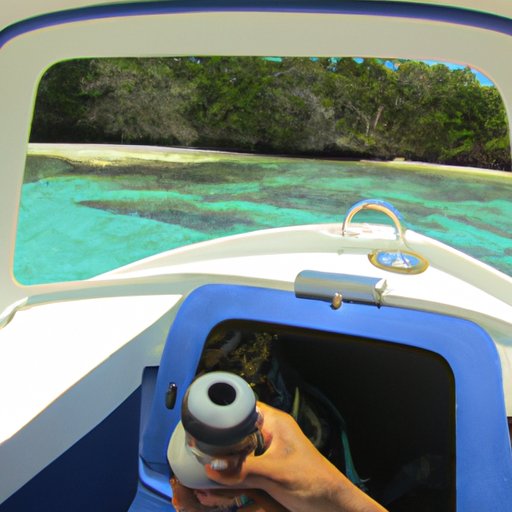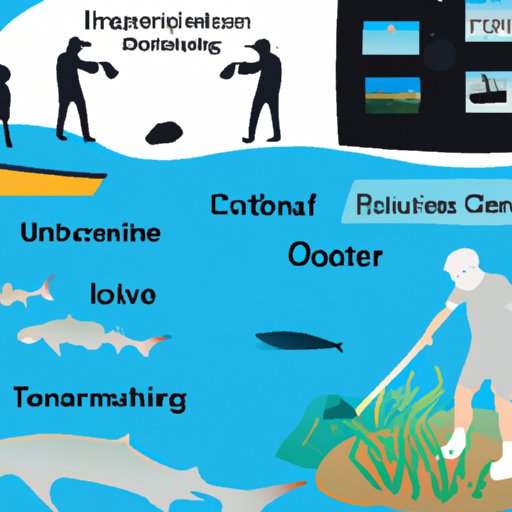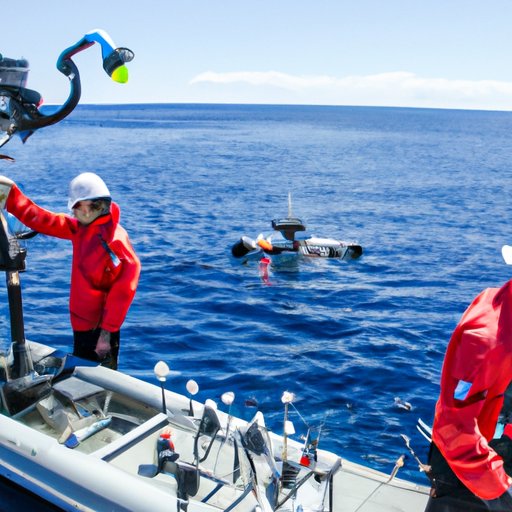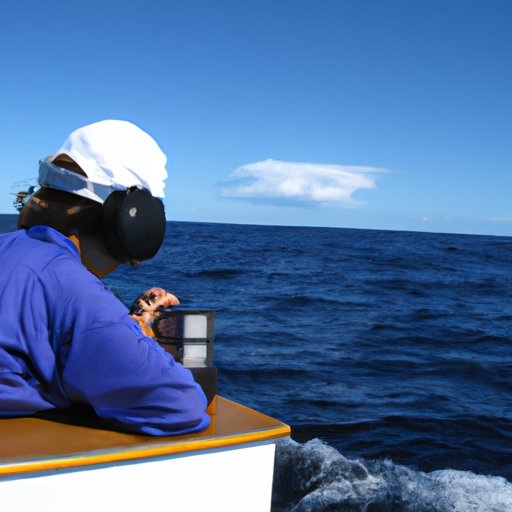Introduction
Marine biology is the scientific study of life in the oceans and other saltwater habitats. It encompasses a wide variety of topics, from studying the behavior of aquatic organisms to understanding the complex relationships between organisms and their environment. Marine biologists play an important role in the conservation and management of our planet’s ocean ecosystems, and their research helps us better understand the impact of human activities on these fragile environments. One of the most common questions asked about marine biology is whether or not it involves a lot of travel. In this article, we will explore the answer to this question by examining the life of a marine biologist, the need for them to travel in their work, and the different types of travel experiences they can have.
Exploring the Life of a Marine Biologist: Do They Travel?
The life of a marine biologist can be quite diverse and exciting. Marine biologists typically spend part of their time in the lab conducting experiments and analyzing data, and the other part in the field observing and collecting samples. This allows them to gain a greater understanding of the ocean ecosystems they are studying. But do marine biologists travel in order to conduct their research? Let’s take a closer look.
What is a typical day like for a Marine Biologist?
A typical day for a marine biologist will depend on the type of research they are conducting. For those who specialize in laboratory-based research, their day may involve setting up experiments, collecting and analyzing data, and writing reports. For those who specialize in field-based research, their day may involve traveling to coastal areas to observe wildlife, collect samples, and document their findings.
What types of research do Marine Biologists specialize in?
Marine biologists specialize in a variety of research areas, including marine mammal behavior and physiology, coral reef ecology, fisheries management, and oceanography. Depending on the type of research they are conducting, they may need to travel to different locations to collect data or observe wildlife.
What kinds of travel opportunities are available to Marine Biologists?
The type of travel opportunities available to marine biologists will depend on the type of research they are conducting. Some marine biologists may be required to travel long distances to conduct fieldwork, while others may be able to conduct their research in local areas. Marine biologists may also have the opportunity to travel abroad to participate in conferences, workshops, and other research-related events.
What’s It Like to Be a Marine Biologist and How Much Travel is Involved?
Being a marine biologist is an exciting and rewarding career that offers a unique opportunity to explore the world’s oceans. Marine biologists often have the chance to travel to some of the most beautiful places on earth in order to conduct their research. But how much travel is involved in being a marine biologist? Let’s take a look.
What kind of work environment do Marine Biologists work in?
Marine biologists typically work both in the lab and in the field. In the lab, they may be conducting experiments and analyzing data, while in the field they may be observing wildlife or collecting samples. Marine biologists may also be required to travel to attend conferences or collaborate with other scientists.
What type of travel is required in order to conduct research?
The type of travel required in order to conduct research will depend on the type of research being conducted. Those who specialize in laboratory-based research may not need to travel at all, while those who specialize in field-based research may need to travel to coastal areas or even abroad in order to collect samples or observe wildlife. Additionally, marine biologists may need to travel to attend conferences or collaborate with other scientists.
What are the benefits of travel for Marine Biologists?
Traveling for research purposes can be an incredibly rewarding experience for marine biologists. Not only does it give them the chance to explore new places and learn more about the ocean, but it also provides them with the opportunity to collaborate with other scientists and stay up-to-date on the latest research and developments in their field. Traveling also allows marine biologists to gain first-hand experience with the organisms and environments they are studying, which can be invaluable in understanding the complexities of marine ecosystems.
Examining the Need for Marine Biologists to Travel in Their Work
Traveling is an essential part of the job for many marine biologists. Not only does it allow them to gain first-hand experience with the organisms and environments they are studying, but it also gives them the opportunity to collaborate with other scientists and attend conferences or workshops. However, there are some challenges associated with travel for marine biologists. Let’s take a look at why it is important for them to travel and what types of research require them to do so.
Why is it important for Marine Biologists to travel?
Traveling is an important part of the job for many marine biologists. It allows them to gain first-hand experience with the organisms and environments they are studying, which can be invaluable in understanding the complexities of marine ecosystems. It also provides them with the opportunity to collaborate with other scientists, attend conferences and workshops, and stay up-to-date on the latest research and developments in their field. Additionally, traveling can be a great way for marine biologists to gain insight into different cultures and customs around the world.
What types of research require Marine Biologists to travel?
Field-based research is one of the main types of research that requires marine biologists to travel. Fieldwork involves traveling to coastal areas or even abroad in order to observe wildlife, collect samples, and document their findings. Additionally, marine biologists may need to travel to attend conferences or collaborate with other scientists in order to stay up-to-date on the latest research and developments in their field.
What are some of the challenges associated with travel for Marine Biologists?
Traveling can be a great opportunity for marine biologists, but it can also present some challenges. One of the main challenges is the cost associated with travel, as it can be expensive to pay for plane tickets, lodging, and other expenses. Additionally, traveling can be difficult to coordinate if you don’t have access to reliable transportation or if you are traveling to a remote location. Finally, marine biologists may need to obtain visas and other paperwork in order to travel abroad, which can be time consuming and complicated.

The Benefits of Marine Biology Fieldwork and How it Relates to Travel
Fieldwork is an integral part of the job for many marine biologists. It allows them to gain first-hand experience with the organisms and environments they are studying, which can be invaluable in understanding the complexities of marine ecosystems. But what are the benefits of conducting fieldwork as a marine biologist and how does it relate to travel? Let’s take a look.
What are the benefits of conducting fieldwork as a Marine Biologist?
Conducting fieldwork as a marine biologist has numerous benefits. Not only does it provide the opportunity to gain first-hand experience with the organisms and environments they are studying, but it also allows them to observe and document changes over time. Additionally, fieldwork can help marine biologists build relationships with local communities and provide them with valuable insight into different cultures and customs. Finally, fieldwork offers the chance to collect samples and data that can be used to further research in the field.
How does fieldwork relate to travel for Marine Biologists?
Fieldwork often requires marine biologists to travel in order to collect samples and observe wildlife. This can be an incredibly rewarding experience for marine biologists, as it gives them the chance to explore new places and gain firsthand experience with the organisms and environments they are studying. Additionally, traveling for fieldwork can provide marine biologists with the opportunity to collaborate with other scientists, attend conferences and workshops, and stay up-to-date on the latest research and developments in their field.
What steps can be taken to make fieldwork more accessible?
Making fieldwork more accessible is an important step in ensuring that marine biologists have the opportunity to conduct research in a variety of locations. One way to do this is to provide financial assistance for travel expenses, such as plane tickets, lodging, and other costs associated with fieldwork. Additionally, providing access to reliable transportation and making sure that marine biologists have the necessary paperwork and visas to travel abroad can help make fieldwork more accessible.

Investigating the Different Types of Travel Experiences for Marine Biologists
Traveling for research purposes can be an incredibly rewarding experience for marine biologists. Not only does it give them the chance to explore new places and learn more about the ocean, but it also provides them with the opportunity to collaborate with other scientists and stay up-to-date on the latest research and developments in their field. But what are the different types of travel experiences available to marine biologists? Let’s take a look.
What are the different types of travel experiences for Marine Biologists?
There are a variety of travel experiences available to marine biologists, depending on the type of research they are conducting. For those who specialize in laboratory-based research, their travel may involve attending conferences or collaborating with other scientists. For those who specialize in field-based research, their travel may involve traveling to coastal areas or even abroad in order to collect samples or observe wildlife.
What type of preparation do Marine Biologists need for each type of travel experience?
The type of preparation needed for each type of travel experience will depend on the type of research being conducted. For those who specialize in laboratory-based research, their preparation may involve researching the conference or workshop they are attending and preparing any materials they need to present. For those who specialize in field-based research, their preparation may involve obtaining the necessary permits, arranging transportation, and packing the appropriate equipment and supplies.
What kinds of activities do Marine Biologists engage in while traveling?
The type of activities marine biologists engage in while traveling will depend on the type of research they are conducting. For those who specialize in laboratory-based research, their activities may involve attending conferences, collaborating with other scientists, and presenting their research. For those who specialize in field-based research, their activities may involve traveling to coastal areas or even abroad in order to collect samples or observe wildlife.

Exploring the Possibilities of Remote Research for Marine Biologists
In recent years, advances in technology have opened up new possibilities for conducting research remotely. But what are the advantages and disadvantages of remote research for marine biologists and how has technology impacted the ability to conduct remote research? Let’s take a look.
What are the advantages and disadvantages of remote research?
Remote research has both advantages and disadvantages for marine biologists. On the one hand, it can be a great way to save time and money on travel expenses. Additionally, it can provide the opportunity to collaborate with other scientists and access data from around the world. On the other hand, remote research can be limited in terms of the type of data that can be collected and the level of detail that can be observed. Additionally, it can be difficult to establish relationships with local communities when conducting remote research.
How has technology impacted the ability to conduct remote research?
Technology has had a significant impact on the ability to conduct remote research. Advances in satellite imaging and telecommunication technologies have made it possible to access data from around the world in real-time. Additionally, drones and other robotic technologies have made it possible to collect data without the need for physical presence. Finally, virtual reality technologies have enabled researchers to experience remote locations as if they were actually there.
What are some of the potential applications of remote research for Marine Biologists?
Remote research has a number of potential applications for marine biologists. For example, it can be used to monitor and survey marine species, track changes in ocean temperatures, and observe the impacts of climate change on marine ecosystems. Additionally, remote research can be used to access data from remote locations that may otherwise be inaccessible due to political or logistical constraints.
Conclusion
Marine biologists play an important role in the conservation and management of our planet’s ocean ecosystems. Many marine biologists travel in order to conduct their research, as it provides them with the opportunity to explore new places, collaborate with other scientists, and gain first-hand experience with the organisms and environments they are studying. Additionally, advances in technology have opened up new possibilities for conducting remote research, which can provide marine biologists with access to data from around the world. As we continue to explore the depths of our oceans, the importance of marine biologists and their ability to travel will remain a key component in understanding and protecting these fragile ecosystems.
(Note: Is this article not meeting your expectations? Do you have knowledge or insights to share? Unlock new opportunities and expand your reach by joining our authors team. Click Registration to join us and share your expertise with our readers.)
